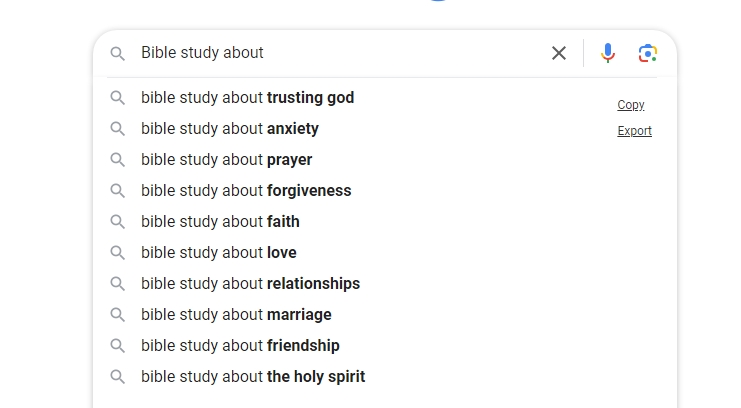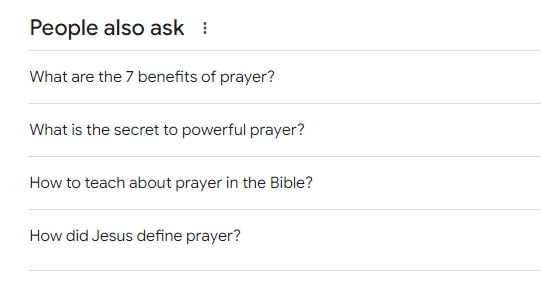How to do Basic Keyword Research for Your Website
So, you know you need to do keyword research to drive the right traffic to your site. Now what? How exactly do you do that?
I am going to share some quick and simple ways to do basic keyword research for beginners.
Keyword Research Tools
Here are two easy tools, of the many that exist, that are quick to get started with and do some research.
Google Search (free)
This is the simplest way to do basic keyword research. There are three elements to look for when you type something in the Google search bar:
- Autocomplete suggestions: Before you hit “enter” to actually have Google search for what you typed, there is a dropdown list of ways to finish the phrase. These actually come from things people have searched for.

For example, if you want to write Bible studies, type “Bible study about” and you can see what types of Bible studies people have searched for. If you choose one of these topics and word it this way, it improves the chances of traffic being sent your way.
- People Also Ask: Once you hit “enter” on your search term, among the list of websites, Google also gives you a list of other questions people are specifically typing in the search bar, related to your topic. Again, this is helpful, because if you use these exact phrases in your writing, the search engines know you are answering those questions.

The screenshot above includes the questions listed after I hit enter on “Bible study about prayer.” How do you use these questions? Think about an article on your website promoting your Bible study about prayer. A question about the benefits of prayer (and your answers to that question) could make an entire section of that article.
- People Also Search For/Related Searches: Now scroll all the way to the bottom of the results screen. You will find this section of other things people search for who also searched for your same term. These can give you insight into the person you are trying to reach, or how else they might be searching for what you are offering.

Use this if you need additional ideas for how to phrase things, or even what to offer, like pdfs or Bible studies aimed at different kinds of groups.
Downside: Free Google searches do not provide search volume, the data on how many people are searching for your phrases. But you do know whether they are searching for things, and that is a place to start, especially if you have never done keyword research before.
Keywords Everywhere (affordable)
The benefit of the Keywords Everywhere extensions is that they give you search volume, telling you approximately how many people are searching for your content monthly over the last 12 months. Their lowest level plan is now $27/year, giving you 100,000 searches.
Once you have installed the extension for the browser you will be using, purchased the Bronze plan, and confirmed your API key, you are ready to do some research.
First, type a search term you have in mind into the Google search bar. Hit enter. The first helpful piece of information to look for is right under the search bar now.

This shows that our phrase “Bible study about prayer” has a search volume of 1,900/month over the last 12 months. This is a good number.
Anywhere between 400 and 10,000 is a sweet spot for most topics. Any less than that, and not as many people are searching for it. Much more than that and the competition will be higher, as more people will also be using those keywords.
You could stop here. This is basic keyword research. You have a solid keyword phrase with excellent search volume. Or you could scroll down and look to the right for a few more phrasing ideas.
Depending on your search, you will find sections on the right of your screen titled:
- People Also Search For
- Topical Keywords
- Related Keywords
- Long-Tail Keywords
All of these have variations of your original phrase and other suggestions of things people are searching for… each with their own search volume!
Downside: If I had to say there was a downside to my favorite keyword research tool, it would be that the credits expire after a year if you don’t use them, and you have to purchase again. But in my opinion, it’s totally worth it.
Tips for Creative Keyword Research
How do you know what to type in that search bar when doing keyword research? Here are some ways to think about this process.
- Brainstorm a list of words and short phrases associated with your business, or even your specific topic you are writing about. These can be where you start.
- Be concise when you search. Avoid long phrases or complicated ways of phrasing things.
- Use synonyms and related words. If your first search does not bring up what you want, try a word that means the same thing. (It is not cheating to have a thesaurus tab open on your browser at the same time!)
- Try adding popular search phrases to your words like “How to,” “Ways to,” “Best,” and “Steps for.” These are words people often use to ask search engines their questions. You want to be their answer!
Next time I will dive into some top mistakes to avoid when researching keywords. For now, be brave, start typing words into Google, and see what it brings up.











2 Comments